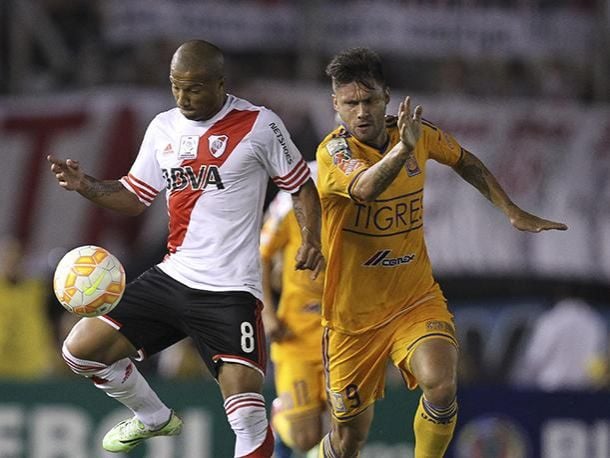The Tigres of Mexico will take on River Plate of Argentina for the third time in this year's edition of the Copa Libertadores, having met twice in their own group, home and away. However, this time it will be for the biggest prize of all of South America, as the first leg will be played at the Estadio Universitario, otherwise known as ''El Volcán'' ("The Volcano").
They were together in Group Six, where both clashes ended in a draw - but there was no doubt that the Tigres were the better side.
In Buenos Aires in early March, the home defence could not cope with the pace of Ecuadorian Joffre Guerron (who cannot even get into the starting line up now because of the new incorperations of the squad) had to dig deep to come back and force a 1-1 draw.
In Mexico, the Tigres were already qualified for the knockout stage, while River were looking for every point they could get, with the risk of possible elimination looming. The Mexicans rested some players and were 2-0 up with less than five minutes to go. However, once more, River managed to force a draw in those five minutes to qualify to the knockout stage.
How the Tigres got here
The Tigres qualified for this final for the first time in their history having beaten Internacional of Porto Alegre of Brazil after losing the first leg in Brazil, 2-1 and winning the second leg at home, 3-1. This run included beating Universitario of Bolivia in the Round of 16 and Emelec of Ecuador in the quarterfinals.
Tigres will become the third ever since to make it to a Copa Libertadores final since Mexican clubs were invited to take part in the competition in 1998. The two other sides: Cruz Azul and Chivas lost in 2001 and 2010 respectively to Boca Juniors and Inter.
Can they make history and become the first ever Mexican team to win South America's biggest prize?
Led by Ricardo "Tuca" Ferretti (now a contender to replace the sacked Miguel ''Piojo'' Herrera as the head coach of Mexico), their relative financial strength paved a huge way entering the first semifiinal. They bought a couple of wingers, Javier Aquino and Jurgen Damm, plus, even more intriguingly, French international center-forward and second top-goalscorer in Ligue 1 last season, Andre-Pierre Gignac from Marseille.
Can they secure the first blow in Mexico before defining in Argentina?
How River got here
It has been an interesting story for the Buenos Aires powerhouse.
In 2011, they were relegated to the second division. In 2012, they came back. In 2013, they won the league and in 2014, they won the Copa Sudamericana (South America's Europa League) for their first continental title since 1997.
During that time, Marcelo Gallardo was a player that won that title 18 years ago and now is looking to repeat the feat as a manager by becoming the first manager to win both the Libertadores (1996) and Sudamericana as a player and coach.
River Plate, who were the 16th seed heading into this knockout stage, had to beat their bitter rivals Boca Juniors, after a 1-0 victory at the Monumental in the first leg before the infamous pepper spray incident at La Bombonera that awarded Los Millionarios a spot in the quarterfinals. There, they took on Brazilian giants Cruzeiro where they lost 1-0 at home before reversing the tie with a 3–0 in Belo Horizonte.
In the semifinals, they took on Paraguayans and surprise package Guaraní where they won 2-0 at home and drew 1-1 in Asuncion to take them to their first ever continental final in 19 years. During that time, they brought back Javier Saviola and Lucho Gonzalez after their world adventures outside of South America.
With talents such as Matias Kranevitter and Carlos Sanchez in the midfield, they will be the vital part of this River side heading into this final in Mexico - but can they be able to stop the new signings made by the Mexicans?
Other key notes
This final will be played beyond two legs and while the Tigres were seeded higher than River in the knockout stage, CONMEBOL state that if a Mexican side made it to the final, the first leg would be played in Mexico - that way the second leg final will be defined in South America (Buenos Aires).
Additionally, unlike previous knockout stage matches, they away goal rule is not used in these two finals.
Also, because Tigres represents CONCACAF, even if they win the Libertadores, they cannot represent CONMEBOL for the FIFA Club World Cup in Japan later in December, as Club America won the CONCACAF Champions League, meaning River Plate will take their place and return to Japan for the first time since 1996 for the Intercontinental Cup final against UEFA Champions League winners Juventus.










































